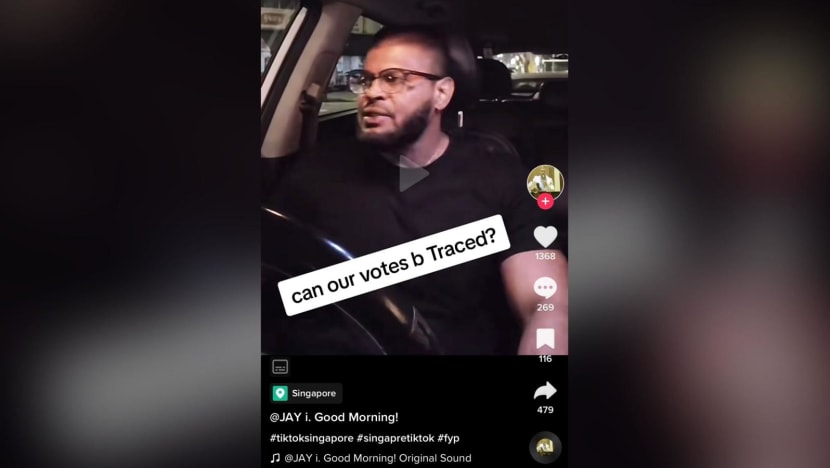POFMA order issued to TikTok user over false claim about voting secrecy

A screengrab of the TikTok post by user dr.ishhaq.jay made on Jul 17, 2023.
SINGAPORE: A correction direction was issued to a TikTok user on Friday (Aug 18) after he falsely claimed that the government can trace votes and penalise voters based on their votes, the Elections Department (ELD) said.
Minister-in-charge of the Public Service Chan Chun Sing instructed the Protection from Online Falsehoods and Manipulation Act (POFMA) Office to issue the correction direction to the user, dr.ishhaq.jay, and a targeted correction direction to TikTok in relation to the post, which was made on Jul 17.
"The user 'dr.ishhaq.jay' will be required to create a new TikTok post containing a correction notice which states that the TikTok post contains a false statement of fact, and provides a link to the government's clarification," ELD said.
"TikTok Pte Ltd will also be required to communicate a correction notice to all end-users in Singapore that had accessed the TikTok post."
A targeted correction direction is a direction issued to an internet intermediary whose service was used to communicate a falsehood.
The direction requires the intermediary to communicate a correction notice by means of its service to all users in Singapore who access the falsehood through its service.
This is so that users who see the falsehood on a platform also see the correction notice on that platform.
CNA understands that TikTok has taken action to comply with the directive, by inserting a notice on dr.ishhaq.jay's video, including a link to the government’s clarification, and is taking action to send inbox notifications to users that have seen the content.
A check by CNA on Saturday morning showed that dr.ishhaq.jay had put up a correction notice.
"RIGOROUS AND COMPREHENSIVE" PROTECTIONS
An article published on the government's fact-checking website Factually explained why dr.ishhaq.jay's claims were false.
"The Parliamentary Elections Act 1954 (PEA), and the equivalent provisions of its predecessor Acts, provide for voting secrecy," the article said.
"The government (including ELD) has complied strictly with the statutory procedures and obligations relating to voting secrecy, as a matter of policy and practice.
"The statutory procedures and obligations to protect voting secrecy are rigorous and comprehensive. For example, every officer, clerk, interpreter, candidate and agent authorised to attend at a polling station or at the counting of votes must, before so attending, make an oath of secrecy."
The article also pointed out that, for votes cast in person at polling stations, there is no break in the chain of custody of ballot papers transported from the polling stations to the counting centres, and from the counting centres to the Supreme Court. This is provided for in another set of statutory procedures.
"The ballot papers would be sealed before they are retained in safe custody at the Supreme Court for six months and subsequently destroyed," the article said.
"This process is transparent and open to observation by candidates and their agents."
While ballot papers have serial numbers, they serve to protect the integrity of the electoral process, the Factually article said.
Serial numbers enable the accounting of all ballot papers issued and cast, and safeguard against counterfeiting and voter impersonation.
Calling out the serial numbers and names of voters also allows polling agents to validate that the voters are listed in their copy of the register.
"When the ballot paper is issued, the voter serial number is written on the ballot paper counterfoil to facilitate vote tracing, if necessary, (for example), if there are allegations that the vote was fraudulently cast," the article said.
"However, inspection of the sealed votes is allowed only with an order from the General Division of the High Court, and such an order can only be made in limited circumstances.
"The judge hearing the application must be satisfied that the inspection is required for the purposes of instituting or maintaining a prosecution or an application under Section 90 of the PEA, which seeks to void an election on certain limited grounds, including breaches of the PEA that affected the election result or corrupt or illegal practices committed in the election by a candidate."
The government cannot trace who a voter has voted for as it wishes, the article said in conclusion.













